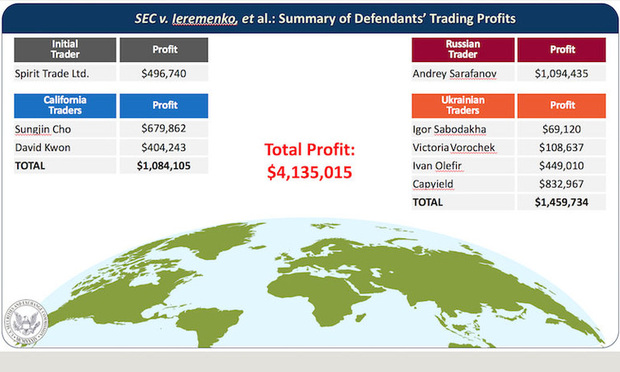2 Ukrainian Men Face Criminal Charges in SEC Hacking Case
Artem Radchenko, 27, and Oleksandr Ieremenko, 26, both from Kiev, Ukraine, are alleged to have participated in a scheme to hack into SEC's EDGAR database to get nonpublic information. The SEC claims the participants' trades generated at least $4.1 million in illegal profits.
January 15, 2019 at 03:16 PM
4 minute read
 SEC brings charges in EDGAR hacking case. (Graphic Courtesy of the SEC)
SEC brings charges in EDGAR hacking case. (Graphic Courtesy of the SEC)
Federal prosecutors have filed criminal charges against two Ukrainian men accused of hacking into the U.S. Securities and Exchange Commission's computer system to spread nonpublic information to a network of traders who illegally profited from it.
Federal prosecutors in New Jersey on Tuesday unsealed a 16-count federal indictment charging Artem Radchenko, 27, and Oleksandr Ieremenko, 26, both from Kiev, Ukraine, with securities fraud conspiracy, wire fraud conspiracy, computer fraud conspiracy, wire fraud, and computer fraud.
“The defendants charged in the indictment announced today engaged in a sophisticated hacking and insider trading scheme to cheat the securities markets and the investing public,” said New Jersey U.S. Attorney Craig Carpenito in a press release announcing the criminal charges. “They targeted the Securities and Exchange Commission with a series of sophisticated and relentless cyber-attacks, stealing thousands of confidential EDGAR filings from the Commission's servers and then trading on the inside information in those filings before it was known to the market, all at the expense of the average investor.”
The indictment claims that Ieremenko participated in a previously disclosed scheme to hack into the agency's electronic filing system and to get nonpublic information to trade on. Ieremenko was charged in 2015 with allegedly hacking newswire services to gain nonpublic information as part of a scheme that the SEC claims yielded more than $100 million in profits.
According to Tuesday's criminal indictment, Ieremenko “employed some of the same techniques and methods that he had used in the Newswire Hacking Scheme” when hacking into the SEC's Electronic Data Gathering, Analysis and Retrieval system, or EDGAR. According to the indictment, the hacked EDGAR servers are housed in New Jersey.
Prosecutors claim that the defendants sent emails to SEC employees that were designed to appear as if they were coming from other employees at the agency. The indictment claims that those phishing emails were used to install malware on certain SEC computers which the defendants then used to get access to filings from publicly traded companies that had not yet been made public.
In a related civil enforcement action filed Tuesday in the District of New Jersey, lawyers at the SEC claim that Ieremenko worked alongside six individual traders in California, Ukraine, and Russia and two entities to make trades before more than 150 earnings releases from May to October 2016. The SEC claims those trades generated at least $4.1 million in illegal profits.
Beyond Radchenko and Ieremenko, the SEC's civil complaint in the case names six additional individuals and two entities that the agency claims traded on information gleaned from the hacking scheme. The individual defendants include Sungjin Cho and David Kwon in Los Angeles; Igor Sabodakha, Victoria Vorochek, and Ivan Olefir in Ukraine, and Andrey Sarafanov in Russia. The entities charged include Capyield Systems Ltd., allegedly owned by Olefir, and Spirit Trade Ltd.
Information about defense counsel in both the criminal and civil cases wasn't immediately available.
In a statement released Tuesday, SEC Chairman Jay Clayton said that the agency must remain vigilant to maintain the integrity of the market.
“No system can be entirely safe from a cyber intrusion,” Clayton said. “Here at the SEC, we recognize that we must continuously use the resources available to us efficiently and effectively to bolster our cybersecurity defenses and reduce our cyber risk profile.”
Read the indictment:
Read the SEC complaint:
This content has been archived. It is available through our partners, LexisNexis® and Bloomberg Law.
To view this content, please continue to their sites.
Not a Lexis Subscriber?
Subscribe Now
Not a Bloomberg Law Subscriber?
Subscribe Now
NOT FOR REPRINT
© 2025 ALM Global, LLC, All Rights Reserved. Request academic re-use from www.copyright.com. All other uses, submit a request to [email protected]. For more information visit Asset & Logo Licensing.
You Might Like
View All
'Younger and Invigorated Bench': Biden's Legacy in New Jersey Federal Court
5 minute read
3rd Circuit Strikes Down NLRB’s Monetary Remedies for Fired Starbucks Workers


As Trafficking, Hate Crimes Rise in NJ, State's Federal Delegation Must Weigh in On New UN Proposal
4 minute readTrending Stories
- 1Pa. High Court: Concrete Proof Not Needed to Weigh Grounds for Preliminary Injunction Order
- 2'Something Else Is Coming': DOGE Established, but With Limited Scope
- 3Polsinelli Picks Up Corporate Health Care Partner From Greenberg Traurig in LA
- 4Kirkland Lands in Phila., but Rate Pressure May Limit the High-Flying Firm's Growth Prospects
- 5Davis Wright Tremaine Turns to Gen AI To Teach Its Associates Legal Writing
Who Got The Work
J. Brugh Lower of Gibbons has entered an appearance for industrial equipment supplier Devco Corporation in a pending trademark infringement lawsuit. The suit, accusing the defendant of selling knock-off Graco products, was filed Dec. 18 in New Jersey District Court by Rivkin Radler on behalf of Graco Inc. and Graco Minnesota. The case, assigned to U.S. District Judge Zahid N. Quraishi, is 3:24-cv-11294, Graco Inc. et al v. Devco Corporation.
Who Got The Work
Rebecca Maller-Stein and Kent A. Yalowitz of Arnold & Porter Kaye Scholer have entered their appearances for Hanaco Venture Capital and its executives, Lior Prosor and David Frankel, in a pending securities lawsuit. The action, filed on Dec. 24 in New York Southern District Court by Zell, Aron & Co. on behalf of Goldeneye Advisors, accuses the defendants of negligently and fraudulently managing the plaintiff's $1 million investment. The case, assigned to U.S. District Judge Vernon S. Broderick, is 1:24-cv-09918, Goldeneye Advisors, LLC v. Hanaco Venture Capital, Ltd. et al.
Who Got The Work
Attorneys from A&O Shearman has stepped in as defense counsel for Toronto-Dominion Bank and other defendants in a pending securities class action. The suit, filed Dec. 11 in New York Southern District Court by Bleichmar Fonti & Auld, accuses the defendants of concealing the bank's 'pervasive' deficiencies in regards to its compliance with the Bank Secrecy Act and the quality of its anti-money laundering controls. The case, assigned to U.S. District Judge Arun Subramanian, is 1:24-cv-09445, Gonzalez v. The Toronto-Dominion Bank et al.
Who Got The Work
Crown Castle International, a Pennsylvania company providing shared communications infrastructure, has turned to Luke D. Wolf of Gordon Rees Scully Mansukhani to fend off a pending breach-of-contract lawsuit. The court action, filed Nov. 25 in Michigan Eastern District Court by Hooper Hathaway PC on behalf of The Town Residences LLC, accuses Crown Castle of failing to transfer approximately $30,000 in utility payments from T-Mobile in breach of a roof-top lease and assignment agreement. The case, assigned to U.S. District Judge Susan K. Declercq, is 2:24-cv-13131, The Town Residences LLC v. T-Mobile US, Inc. et al.
Who Got The Work
Wilfred P. Coronato and Daniel M. Schwartz of McCarter & English have stepped in as defense counsel to Electrolux Home Products Inc. in a pending product liability lawsuit. The court action, filed Nov. 26 in New York Eastern District Court by Poulos Lopiccolo PC and Nagel Rice LLP on behalf of David Stern, alleges that the defendant's refrigerators’ drawers and shelving repeatedly break and fall apart within months after purchase. The case, assigned to U.S. District Judge Joan M. Azrack, is 2:24-cv-08204, Stern v. Electrolux Home Products, Inc.
Featured Firms
Law Offices of Gary Martin Hays & Associates, P.C.
(470) 294-1674
Law Offices of Mark E. Salomone
(857) 444-6468
Smith & Hassler
(713) 739-1250






